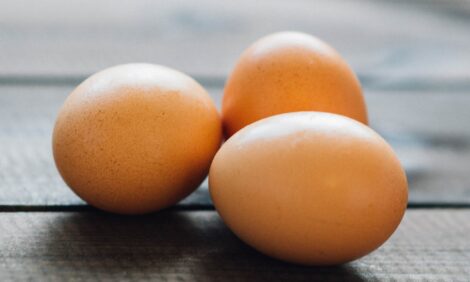



Cutting Vaccinations Could Prove a Costly Mistake
UK - Poultry producers that are facing expensive feed and fuel costs shouldn’t be tempted to cut corners when it comes to vaccines, according to Merial Animal Health Avian Manager, Helen Houghton.She says: “Prices are rising and people are looking to cut costs, but it’s a risk if you cut out vaccines.”
Helen advises producers that most respiratory diseases are best treated with vaccines via spray application. Gut-borne diseases should be prevented by the vaccine being added to drinking water.
Producers can get the most out of spray vaccinations for respiratory diseases like Infectious Bronchitis and Avian Metapneumovirus (TRT) by following a few simple steps.
For broilers, protection from good spray vaccination reduces the possibility of economic losses caused by diseases that enter via the respiratory tract and can cause weight loss and general poor performance of the flock. For layers and breeders, as well as respiratory disease, Infectious Bronchitis viruses can damage the kidneys and oviduct with infections resulting in false layers, drops in production and poor quality eggs.
By using an Ulvavac spray applicator, which was developed exclusively by Merial with Micron, specifically for use in poultry, vaccines are delivered directly to the upper respiratory system – including the eye, nasal cavities and trachea.
Helen says: “The machine was developed because vaccines were not being administered properly. Vaccines are expensive. It’s a big chunk of revenue, so producers need to administer them properly to get the most out of them.
“It’s important that the spray is the correct particle size to get into the upper respiratory system of the chickens. Ulvavac changed the landscape in terms of spray vaccines – before producers were using machines that were meant to spray roses.”
The machine gives a uniform droplet size, is not too heavy to use and is battery powered so it isn’t too noisy for the birds.
Helen says: “I’ve seen producers use sprayers that look like a leaf blower, blowing vaccine towards the ceiling and then the spray falls down. They’re very noisy which upsets the birds, especially pullets that tend to scatter.”
If a vaccine is sprayed at chicken-height, not only will pullets and broilers inhale the vaccine, it will also go into the Harderian gland in the eye stimulating the immune system.
“Merial Animal Health offers to train and audit anyone who vaccinates birds,” says Helen. “We advise producers to use the vaccine immediately after preparation, to turn the lights down and get it as dark as possible in the shed. You don’t want to chase the birds, but walk up and down gently. When you apply vaccines with an Ulvavac, you can see the band of spray is a metre wide and goes three metres out, so it can cover a lot of birds. It is possible to vaccinate 30,000 birds in just 20 minutes.”
Helen advises the best time to spray is during the hours of darkness early in the morning or later in the evening so the birds are at rest.
“Make sure you turn off the ventilation. If there is a lot of air movement the vaccine can get sucked away. Remember to turn it back on straight away – if producers get distracted and fail to remember there can be bird deaths.”
Helen says: “There are different strains of Infectious Bronchitis virus as the virus readily mutates, so choice of vaccine is very important in protecting birds. A new IB virus can occur very quickly or equally disappear very quickly, so vets prescribe a combination of classical IB vaccines such as Massachusetts and variant vaccines such as Gallivac IB88 in a vaccination programme to give good cross protection against any weird and wonderful IB viruses that the birds may become exposed to.”
Helen warns that IB vaccines are “quite fragile”. She says: “When it’s made up you want to use it as soon as possible. If an IB vaccine is put through drinker lines, it can take the birds more than two hours to drink it all so a lot of the vaccine virus will have died before it’s been consumed by the birds.”
She says that thanks to the UK’s climate there tends to be a lot of respiratory diseases compared to places with a warmer and drier climate.
“Also fuel is expensive so during the winter months many producers will reduce the levels of ventilation to save money and as a result ammonia levels in the poultry houses can rise. Which can damage a bird’s respiratory system making it more susceptible to respiratory infections,” Helen adds.
Checklist: Live vaccines are effectively live viruses and so will be killed by all the things that are used to kill viruses on farm like heat, UV light, soap, disinfectants and chlorine. The IB vaccine is fragile so do not use mains tap water to mix it up as the chlorine will damage it. Don’t use deionised water that hasn’t been used for a while as it has the fluoride and chloride taken out so it can grow algae in it. If you are using mains water, use Merial’s Vac Pac Plus stabiliser, which neutralises chlorine and iron. Borehole water can also have iron in it, which will damage the vaccine so should be treated with Vac Pac Plus stabiliser too. Maintaining any equipment and keeping it clean is crucial too.
Further ReadingFind out more information on infectious bronchitis by clicking here. |











